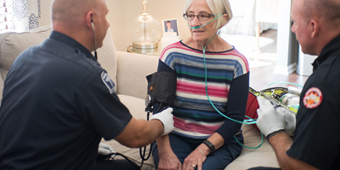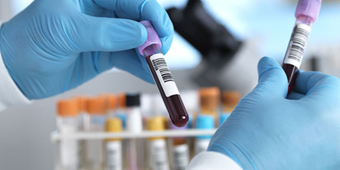When a Broken Heart Gets Physical: Broken Heart Syndrome

Answer a few questions and we'll provide you with a list of primary care providers that best fit your needs.
Emotional heartbreak — such as the end of a significant relationship, the death of a loved one or a major financial loss — can impact your physical health. No surprise there
But did you know that an emotionally broken heart can trigger heart attack-like symptoms? And require immediate medical attention?
That’s the case for a medical condition known commonly as broken heart syndrome. Cardiologist Zakaria Sheikhaden, DO, says the medical term for it is stress-induced cardiomyopathy or takotsubo cardiomyopathy.
What’s Behind Broken Heart Syndrome?
Stress hormones set off by an intense, stressful life event can bring on the symptoms of broken heart syndrome. “The symptoms mimic that of a heart attack,” explains Dr. Sheikhaden. These include intense chest pain, severe shortness of breath, irregular heartbeats, and even cardiogenic shock.
Cardiogenic shock, the most common cause of death in heart attack, occurs when a suddenly weakened heart muscle can’t pump enough blood to meet the body’s needs. This is why you should treat the symptoms of broken heart syndrome seriously and seek emergency medical attention.
Symptoms also can include swelling, especially in the legs, which is also a symptom of heart failure, Dr. Sheikhaden explains.
“In nearly all cases of broken heart syndrome, the symptoms don’t last long; maybe a day or two, or up to a week,” says Dr. Sheikhaden. “With medication they usually resolve on their own.” In rare cases, broken heart syndrome can be fatal.
How Is It Diagnosed?
At first it may seem like you’re having a heart attack. “That’s why we treat it as such until we’re able to determine if any blockages to the heart are causing the symptoms,” says Dr. Sheikhaden. Results of blood work will indicate if you’re having a heart attack.
The key difference from heart attack is that broken heart syndrome does not involve blocked heart arteries.
Besides stressful events, other triggers for broken heart syndrome include:
- Depression or anxiety disorder
- Asthma flare-up
- Surgery
- Chemotherapy
- Adrenaline-producing tumor
- Overdose of adrenaline
Even a happy event like a huge surprise, can cause a release of adrenaline and result in broken heart syndrome, says Dr. Sheikhaden.
Who’s At Risk?
The condition most commonly affects older women, but it also affects men and younger women. You may be at higher risk for broken heart syndrome if someone in your family has had it or you have an anxiety disorder. Heart attack risk factors, such as smoking, do not play a role.
The key difference from heart attack is that broken heart syndrome does not involve blocked heart arteries. And many people with broken heart syndrome have no risk factors for heart disease.
“After suffering one incidence of broken heart syndrome, your chance of having another incident is low,” says Dr. Sheikhaden, “about 5 percent.”
The ability to properly manage your stress can help you avoid broken heart syndrome, according to Dr. Sheikhaden. A heart healthy lifestyle, including a healthy diet and regular exercise, will better prepare you to handle stress.
Research continues to uncover more about the cause of broken heart syndrome and how to diagnose and treat it. Theories include that it results from a brief spasm of the coronary arteries or reduced blood flow to the heart’s smaller blood vessels.
Answer a few questions and we'll provide you with a list of primary care providers that best fit your needs.
Source: American Heart Association; Zakaria Sheikhaden, DO, Premier Cardiovascular Institute





